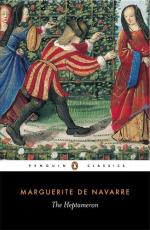“Tis a pity,” said Oisille, “that he did not address his love to a woman possessing as much virtue as he possessed himself. Their amour would then have been the most perfect and honourable that was ever heard of.”
“But prithee tell me,” said Geburon, “which of the two trials do you deem the harder?”
“I think the last,” said Parlamente, “for resentment is the strongest of all temptations.”
Longarine said she thought that the first was the most arduous to sustain, since to keep his promise it was needful he should subdue both love and himself.
“It is all very well for you to talk,” said Simontault, “it is for us who know the truth of the matter to say what we think of it. For my own part, I think he was stupid the first time and witless the second; for I make no doubt that, while he was keeping his promise, to his mistress, she was put to as much trouble as himself, if not more. She had him take the oath only in order to make herself out a more virtuous woman than she really was; she must have well known that strong love will not be bound by commandment or oath, or aught else on earth, and she simply sought to give a show of virtue to her vice, as though she could be won only through heroic virtues. And the second time he was witless to leave a woman who loved him, and who was worth more than his pledged mistress, especially when his displeasure at the trick played upon him had been a sound excuse.”
Here Dagoucin put in that he was of the contrary opinion, and held that the gentleman had on the first occasion shown himself constant, patient and true, and on the second occasion loyal and perfect in his love.
“And how can we tell,” asked Saffredent, “that he was not one of those that a certain chapter calls de frigidis et malificiatis?” (4)
4 This is an allusion to the penalties pronounced by several ecclesiastical Councils, and specified in the Capitularies, against those who endeavoured to suspend the procreative faculties of their enemies by resorting to magic. On this matter Baluze’s collection of Capitularies (vol. i.) may be consulted. The “chapter” referred to by Margaret is evidently chapter xv. (book vi.) of the Decretals of Pope Boniface VIII., which bears the title of De frigidis et maleficiatis, and which is alluded to by Rabelais in Pantagruel. The belief in the practices in question dates back to ancient times, and was shared by Plato and Pliny, the latter of whom says that to guard against any spell of the kind some wolf fat should be rubbed upon the threshold and door jambs of one’s bed-chamber. In the sixteenth century sorcery of this description was so generally believed in, in some parts of France, that Cardinal du Perron inserted special prayers against it in the ritual. Some particulars on the subject will be found in the Admirables Secrets du Petit Albert, and also in a Traite d’Enchantement, published at La Rochelle




